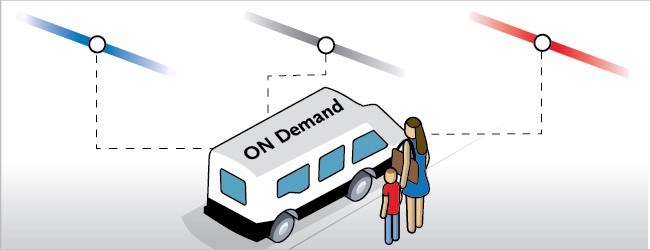This afternoon Metro's Executive Management Committee approved the contract committee approved the contract for the agency's planned Mobility On Demand pilot project.
Metro Chief Innovation Officer Joshua Schank introduced the item joking about the widespread confusion between Metro's Mobility On Demand and MicroTransit pilots. These two innovation pilots are somewhat similar, and even Streetsblog editors have been known to mix them up.
Metro's Mobility On Demand pilot is basically a subsidized ride-hail car (similar to Transportation Network Companies Lyft or Uber) that will serve first/last mile needs for specific Metro Stations. Metro's planned MicroTransit pilot, the finer details of which are still emerging, will be more of a shuttle fleet serving a designated area.
The one-year Mobility On Demand pilot's overall $3.4 million budget is partially funded through a Federal Transit Administration (FTA) demonstration grant. Metro's contractor, Via, is a relatively small TNC that specializes in partnerships with transit. Via will collect and keep fare revenues, $287,000 of which is their "risk sharing contribution" against their $2.5 million annual contract.
The system is intended to serve first/last mile connections for Metro transit, so all trips must start or end at a Metro station. The service will operate from 6 a.m. to 8 p.m. weekdays.
Riders hail the Via car using the Via app. Like other TNCs, the vehicles are privately-owned cars driven by contract drivers. Like TNC shared-ride products (Lyft Line or UberPOOL) the Mobility On Demand Via rides are shared - if multiple people are going the same way, then they must share the ride.
Riders pay a subsidized fixed-rate fare of $1.75 for a trip. To get this fare, the rider must input a TAP card into the Via app. TAP is not used for payment, but just to allow Metro to ensure Mobility On Demand riders are using Metro. (Customers who do not link to a TAP card are charged a $3.75 flat rate.) Riders who are part of Metro's low-income fare program LIFE can ride Mobility On Demand for free.
In July, Metro announced the three stations for the initial pilot. Stations were selected for geographic diversity, diversity of transit modes (heavy rail, light rail, Bus Rapid Transit, and bus), and for difficult first/last mile situations. Mobility On Demand service to and from the stations is limited to a roughly six-square-mile catchment area.
The three pilot locations are: Artesia Blue Line Station, El Monte Silver Line Station, and North Hollywood Red/Orange Line Station. The tentative catchment maps are shown below.
Several boardmembers, prominently Paul Krekorian and Hilda Solis, expressed concerns over TNC driver background checks not being sufficiently rigorous. Boardmembers also expressed concerns that private drivers would be working for multiple companies and would not prioritize flat-rate rides.
The concerns were outweighed by the interest in going ahead with a pilot to gather experience and data. If approved by the full Metro board, the one-year pilot would begin in late January 2019. Metro has the option to extend the contract for a second year.






